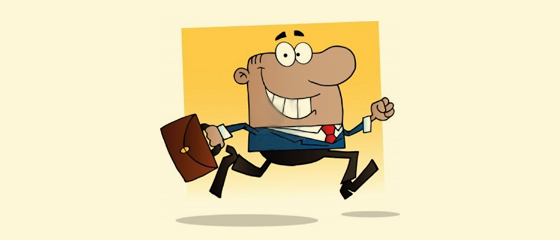Today, it’s easier to find a dinosaur’s skull than it is to find an educated adult without an email address. It’s become the norm, so much so that one’s virtual address is as assumed as their physical one. In fact, if Nairobi were cyberspace, [email protected] would be a Kibera slum address, while [email protected] would portray leafy suburban Muthaiga-like exclusivity.
Tomorrow, the expectation will have gone beyond mere addresses to whatever will be found at those addresses. Consider for a minute how our digital footprints are already becoming as real as the physical. Don’t think Big Brother knows you’re a Muslim? Hmmm… Then how come your phone is always at the co-ordinates (-1.2834, 36.8206) every Friday at 1pm? And why is the keyword Allah occuring in your tweets an average of 13 times a week? And how come 6 out of those 13 times, the tweets are sent within an hour of being at those co-ordinates? Scary, huh? Maybe, maybe not. Truth is, there isn’t much we can do to control the exposure of our online data and interactions. However, what we do (and hopefully will) have control over, is our official web presence. What people say or ‘expose’ about us online isn’t half as important as what our official web presence portrays. Logic therefore prioritizes getting to the top of Google’s result page, for once a person (or organization, or government) realizes that first impressions are priceless, they ought to do everything in their power to be the ones to paint that first picture of themselves when people go a-searching.
It should be easy then to see, at this point, why the design and development of your web presence is as important as its address. You bought a piece of land in the leafy suburbs; you’ll be expecting all kinds of visitors, including the high and mighty that you’d like to engage further. Surely you’ll want the best architects and construction companies to build your residence, right? You can’t risk giving an unimpressive first impression. My definition, therefore, of “bounce rate” is “the percentage of people who don’t make it past the front porch of your website because either they realize that they’re at the wrong house, or you met them outside and gave them exactly what they came for, or they didn’t like what they saw and felt no urge to stay and chit-chat”. Someone go put that on UrbanDictionary already!

So how do you find the right ‘architect’ and ‘contractor’ for your website when you know very little — if anything at all — about architecture and construction? How will you distinguish professionals from quacks in a field where everyone calls themselves “creative” and “the best”? How do you know that someone isn’t just as clueless as yourself when they throw jargon like HTML5 and CSS3 at you? Well, below are 5 trick questions you should ask them and listen carefully to how they answer.
1. What do you use for version control?
Web design is bipartite. The first task to design the interface, but once that’s done, the design has to be transcribed into code so that web browsers can render it and enable your website visitors to navigate and interact with it. The problem is that most so-called ‘web designers’ can’t really code. What they do is download other people’s already coded templates and replace their dummy content with yours. Then charge you tens (if not hundreds) of thousands for it.
One way to ensure that you’re getting unique and authentic work is by hiring web designers who use version control tools to manage the code that they write. The popular ones are Git, Subversion, and Mercurial, which can be hosted and accessed on websites such as github, bitbucket, and beanstalk. At your request, they should be able to add you as an observer on such systems so you can see the progress they make from beginning to end.
2. What are your payment terms?
No web designer worth his salt will begin work without some sort of downpayment, and a contract. If they don’t ask for a downpayment, they don’t value their work. If they don’t ask for a contract, they don’t value commitment. It’s that simple.
It doesn’t matter whether their portfolio is a work of art or whether they were recommended by your aunt. No contract, no deal.
3. What if I don’t like the design?

Try to ask the right questions in order to learn as much as possible about the designer’s approach and process.
This is a discreet way to find out their design process, if at all they have one! You wan’t to hear something like this:
“We design based on your objectives, content, and target audience. Since the process starts with sketches and low fidelity prototypes that we share and refine with you, it’s highly unlikely that the final design will be far from what you expected. We therefore allow up to 3 revisions on the layout and design. If you still don’t like it, you are free to request a cancellation of the contract. If the dissatisfaction, however, is due to a change in your initial requirements, then we’ll revise the quote and go through the process again.”
And here’s what you don’t want to hear:
“Ah, no problem! We’ll just try different options till you find what you like!”
Those are template editors my friend, not web designers. You can learn how to do that on your own in a couple of days, so spare yourself the expense and spend the money on a loved one or something.
4. How will we be changing the content?
About 3 out of every 4 clients who want us to redesign their websites complain that their former designers went into digital exile, along with the server password. Prior to that, they had to contact the web designers in order to make even the smallest change, e.g. the copyright year. That is simply unacceptable.
In this day and age, I cannot find a single reason why anyone should still be building websites that have no content management system (CMS). Asking about a CMS will safeguard you from unnecessary surprises in future. Also, if someone mentions a popular CMS (such as WordPress or Drupal or Joomla), ask them if they make custom themes from scratch. If they don’t, they are just going to repeat what’s been described in Question 1.
5. Will I be on page 1 of Google?
An experienced web designer understands that even a beautifully designed website is of little use if it has no discoverability. As they build the site, they follow certain guidelines and try different creative ways of letting people find you via search engines.
If someone’s answer to this question is simply “yes”, then they’re most likely an amateur and have no clue what they just agreed to.
An expert’s answer will often be something along the lines of “What keywords are you hoping to rank highly for? Interested parties should be able to find you even without knowing your name or your company.” Most of these professionals will do basic on-site optimization, but will inform you that you need a separate budget for aggressive SEO and content creation for the intended target group.
So there you have it. Five questions to help you better gauge the calibre of the web designer you’re about to hire.
Questions? Comments?
Shoot.